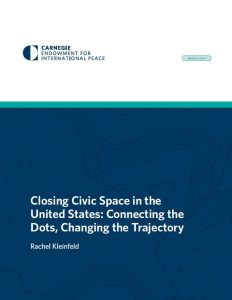New Report: Closing Civic Space in the United States – Connecting the Dots, Changing the Trajectory
11.03.2024 | New report by Dr. Rachel Kleinfeld examines how dozens of governments have restricted the ability of civil society organisations
In this new report by Dr. Rachel Kleinfeld for the Carnegie Endowment for International Peace, the author examines how dozens of governments have restricted the ability of civil society organisations to act and speak through regulations, laws, and vilifying narratives over the past two decades. Now, a similar set of tactics is being rolled out in the United States. What should philanthropists and organisations expect, and what can be done?
Closing Space Internationally
“The absence of civic space was a hallmark of Cold War totalitarianism. There was the individual, and there was the government; any attempt to organize regular people to act or speak publicly in even innocuous ways—such as a birdwatching league, a home church, or a small arts magazine—had to be monitored and approved by the ruling party or crushed. The blossoming of civil society across the former Soviet Union and many other once-closed societies was among the strongest signals that the 1990s wave of democracy was not only toppling authoritarian regimes but also growing roots. Organizations, interest groups, religious congregations, open media, and the free exchange of ideas helped people find their voices, locate their communities, and push their governments and societies to do things that they cared about.
Then, in the mid-2000s, democracy started to recede globally. And the walls started to close in on civil society.
As America’s long wars drained its unipolar geopolitical power, the resurgence of Russia, China, and authoritarian regional powers allowed countries whose leadership commitment to democracy had always been tenuous to choose a different path. Like the garbage compactor in Star Wars bearing down on the Resistance heroes, ruling parties began to systematically and inexorably tighten the space for civil society to do its work. Autocratizing regimes like Russia and Venezuela began first. Their tactics were imitated by politicians moving away from democracy in places like Ethiopia and Nicaragua and eventually by once fulsome but now faltering democracies like India, until the tactics had spread around the globe from Ecuador to Uganda.
Closing Civic Space in the United States
The pushback against civil society initially targeted activities that were easy to paint as concerning— particularly foreign funding for organizations that worked on democracy and human rights issues. Groups were hit with laws forcing them to register as foreign agents, restrictions on accepting foreign donations, regulatory harassment, and rhetorical demonization campaigns. There are, of course, legitimate reasons for countries not to want foreigners supporting their domestic political parties, think tanks, or social causes. Often, governments
cited other reasonable concerns, such as pressure to tighten funding streams to prevent inadvertent terrorist support. But over time, it became clear that the problem with civil society organizations was not their Western sources of funding, or philanthropic overreach, or reasonable countervailing interests. The problem was that governments, both democratic and less so, felt threatened by an increasingly effective civil society. They wanted more control. So they brought a variety of tools to bear that worked systematically to reduce their citizens’ access to information, voice, and power, to prevent people from challenging their ruling parties.”
Rachel Kleinfeld is a senior fellow in Carnegie’s Democracy, Conflict, and Governance Program, where she focuses on issues of rule of law, security, and governance in democracies experiencing polarization, violence, and other governance problems.
Full Report






